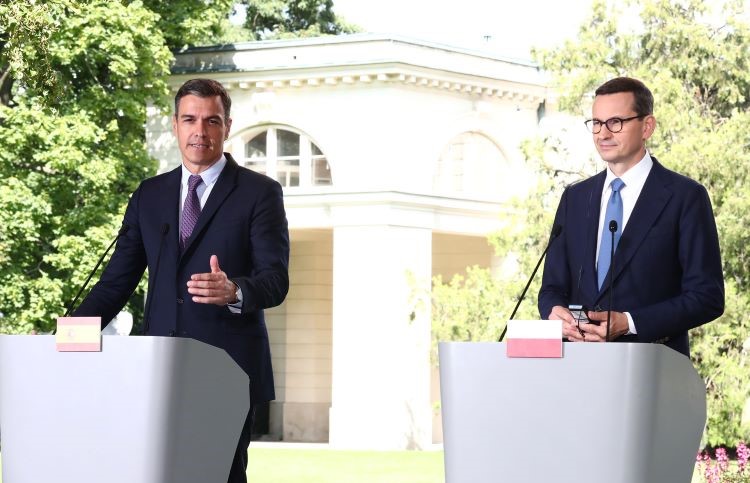The Diplomat
The President of the Government, Pedro Sánchez, and the Prime Minister of Poland, Mateusz Morawiecki, held yesterday in Warsaw the XIV Spanish-Polish Summit, in which both countries pledged to strengthen bilateral military cooperation to address the security challenges generated by “Russia’s war of aggression” in Ukraine.
During the Summit, which gave continuity to the previous bilateral meeting held in Alcalá de Henares on May 31, 2021, the two governments signed a Joint Declaration that marks the beginning of the work to renew the 1992 Treaty of Friendship and Cooperation and that “reflects and highlights the deep ties and shared interests between two partner countries, friends and allies”, as reported by Moncloa in a press release.
The Joint Declaration devotes a large part of its contents to the Russian invasion of Ukraine (a country bordering Poland) and its consequences. Specifically, the two countries condemn “in the strongest terms the aggressive and illegal unprovoked invasion of Ukraine, which has been the most serious and direct threat to the Euro-Atlantic space in decades”, and state that “Spain and Poland are aware of the key importance of unity and the need for the Euro-Atlantic community to close ranks around Ukraine in order to restore peace and a European security order based on rules”.
Madrid and Warsaw also pledge to continue to “support Ukraine in its struggle for freedom, sovereignty, security and territorial integrity, in particular by providing vital assistance and actively promoting the process of imposing sanctions in response to Russia’s war of aggression.” The two governments welcome the recent decision of the European Council to grant Ukraine and Moldova candidate status for EU membership, as well as Georgia “under certain conditions”, and look forward to the “speedy” conclusion of the ratification process of the protocols for the accession of Sweden and Finland to NATO.
On the other hand, Spain and Poland are “fully aware of the threats to the security of the Euro-Atlantic area, be they conventional, hybrid or cyber”, and affirm that the war in Ukraine “has demonstrated the unparalleled value of NATO as a cornerstone of Euro-Atlantic security and defense” and has “confirmed the fundamental importance of the transatlantic link” and that “Russia represents the most serious and direct threat to the security of the Alliance”.
Therefore, the two countries “express their strongest support for strengthening the collective defense of the Alliance against all kinds of threats, both on the eastern and southern flank, which face direct threats to the Alliance”, and stress that the new Strategic Concept, adopted at the recent Madrid Summit, will enable NATO to effectively pursue its defense objectives in the coming years, “by redoubling deterrence and forward defense on the eastern flank and increasing NATO’s ability to reinforce the Allies”. “Spain and Poland are confident that the 14th Summit will provide a new impetus that will open new directions in bilateral defense and military cooperation,” the Declaration continues.
Spain and Poland also advocate strengthening the mechanisms available to the EU to improve the deteriorating European security situation and warn that “it is of utmost importance to increase military support to Ukraine and the rapid replenishment of capability shortfalls, in particular by making effective use of and increasing the budget of the European Peace Support Fund, which has proven its usefulness in complementing EU actions and NATO’s deterrence activity.”
“My thanks to Poland,” Sanchez declared during the press conference following the summit. “Thank you for your resistance in the face of a war waged by Russia next door, on fully European territory, wanting to redraw our borders,” he continued. “Thank you for the solidarity shown in welcoming millions of Ukrainians fleeing horror. Thank you for your ability to mobilize Europe to respond to Ukraine’s needs. Thank you also for your ability to collaborate in the face of challenges that we thought we had already overcome, such as food security,” he added. “Spain and Poland are two countries very aware that our contribution is necessary for the security of the continent, and that cooperation in defense is an indivisible element of our bilateral relationship,” he said.
Precisely, Pedro Sánchez was accompanied at the Summit by the Minister of Defense, Margarita Robles, who signed with her Polish counterpart a broad Memorandum of Understanding covering both traditional areas of cooperation – military, industrial, technical, exercises, interoperability or personnel exchanges – as well as the commitments resulting from the Allied Summit in Madrid, “in addition to preparing the development of the Strategic Compass, in which Spain will play a very important role during the Spanish Presidency of the EU, in the second half of 2023”.
The head of the Executive was also accompanied by the Ministers of Foreign Affairs, José Manuel Albares; Industry, Trade and Tourism, Reyes Maroto; Transport, Raquel Sánchez, and Inclusion, José Luis Escrivá, who held parallel meetings with their respective Polish counterparts to adopt several important agreements. Apart from the Defense Memorandum, a Declaration was signed in Warsaw that affects the Solidarity Transport Knot (CPK), the largest infrastructure project in the EU. In this Declaration “the recent contract obtained by INECO for the analysis of high speed standards is made visible, which opens the way to future tenders within this project for more Spanish companies, as well as continuing to consolidate the positioning of Spanish railway engineering as a world reference in the development of high speed”, said Moncloa.
Pablo González
During the press conference, Pedro Sánchez was asked about the situation of the Spanish journalist Pablo González, who has been in provisional prison for five months in Poland for an alleged espionage crime while covering the war in Ukraine.
In this regard, Sanchez assured that “the Government of Spain, logically, what it does is to respect the rule of law in Poland and, therefore, the Polish justice system, just as we always ask to respect the Spanish justice system and that of any EU country”. According to the head of the Executive, Pablo González “receives consular assistance, like any other Spanish citizen in this situation”. Likewise, he assured that the Spanish consul has visited him “personally on several occasions”, that the Embassy is “aware of this situation and receives all the available information” and that the Minister of Foreign Affairs is in contact with his Polish counterpart to “follow up the issue and to support the family of the Spaniard, who is now on trial”.
The President of the Government also announced that he had had “the opportunity to talk” about this issue with Morawiecki, whom he thanked for the “collaboration of the Polish Government in this respect”. The wife, Ohiana Goiriena, had asked Pedro Sánchez in the last few hours to take advantage of his meeting with the Polish Prime Minister to “intercede” for her husband and ensure that he can “have a fair defense and trial, and, above all, that his rights are respected”. González, born in Russia and resident in Biscay, was arrested in Poland, very close to the Ukrainian border and while he was covering as a freelance the arrival of war refugees, under the accusation of being an agent of the Intelligence Directorate of the Russian Armed Forces.







